Computer Crime: Hacking, Threat Agents, and Criminal Activity
VerifiedAdded on 2023/03/31
|6
|1263
|88
Essay
AI Summary
This essay provides a comprehensive overview of computer crime, beginning with a definition of the term and exploring its vulnerabilities compared to traditional crime. It differentiates between hacking and computer crime, explaining the concept of actus reus and mens rea in the context of digital offenses. The essay then defines hacking and introduces the notion of threat agents, classifying them based on motivation, opportunity, and capability. A critical discussion follows, examining why hacking is not always considered a criminal activity, differentiating between white, black, and grey hat hackers. The analysis highlights the varying intentions and ethical standards of each group, concluding that hacking becomes a crime based on the intent and actions of the individual involved. The essay provides a nuanced understanding of computer crime, its various forms, and the diverse actors involved.
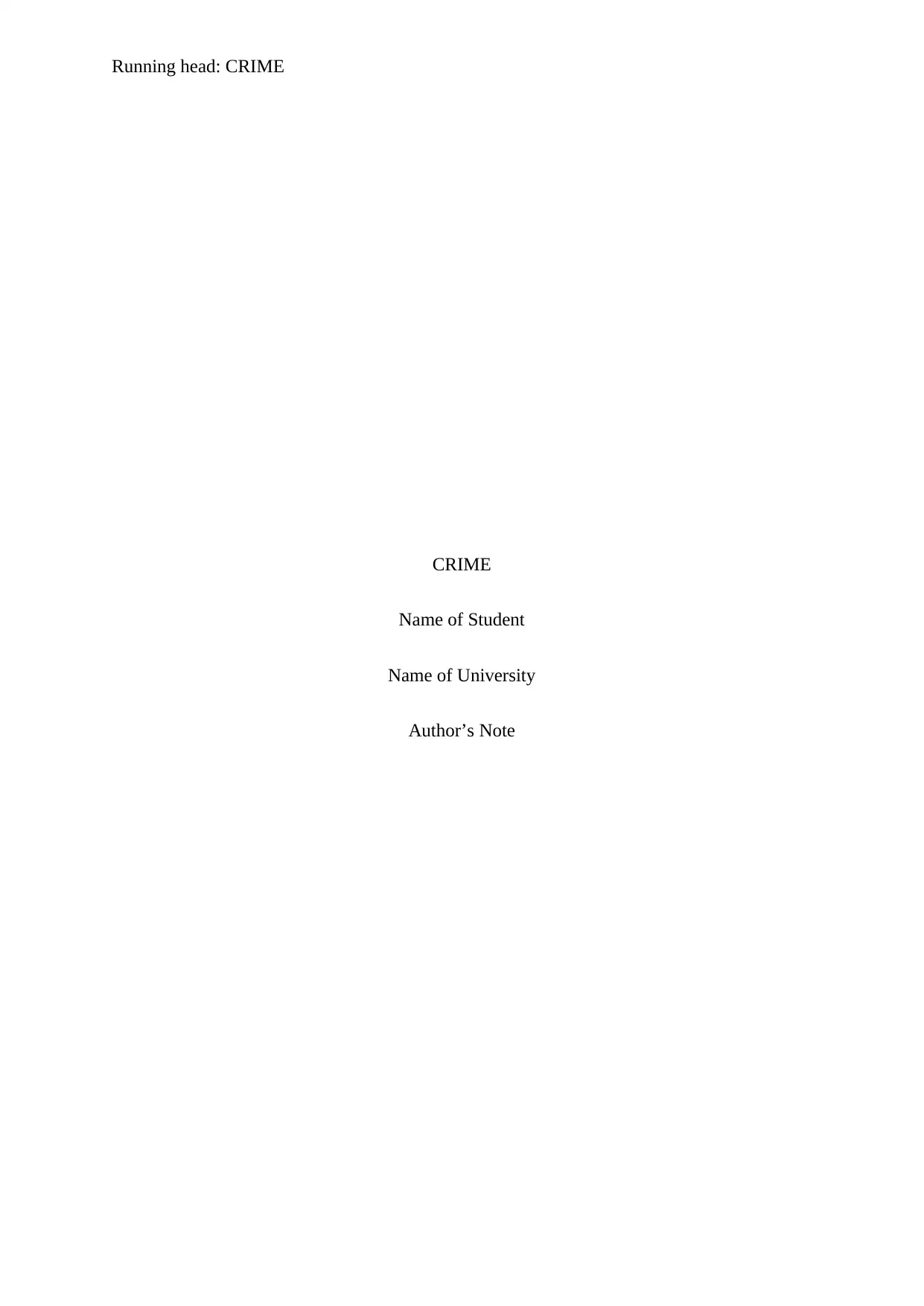
Running head: CRIME
CRIME
Name of Student
Name of University
Author’s Note
CRIME
Name of Student
Name of University
Author’s Note
Paraphrase This Document
Need a fresh take? Get an instant paraphrase of this document with our AI Paraphraser
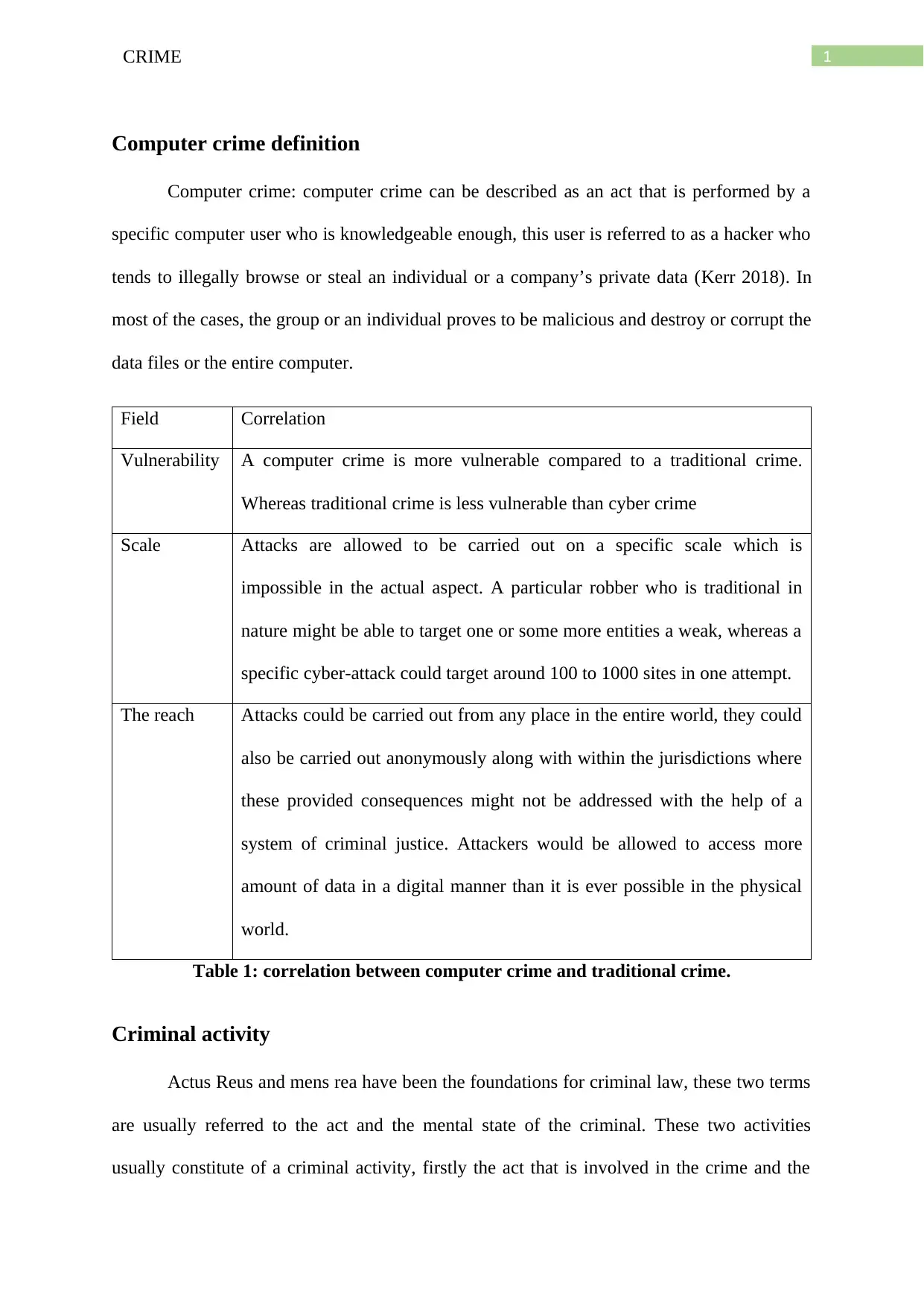
1CRIME
Computer crime definition
Computer crime: computer crime can be described as an act that is performed by a
specific computer user who is knowledgeable enough, this user is referred to as a hacker who
tends to illegally browse or steal an individual or a company’s private data (Kerr 2018). In
most of the cases, the group or an individual proves to be malicious and destroy or corrupt the
data files or the entire computer.
Field Correlation
Vulnerability A computer crime is more vulnerable compared to a traditional crime.
Whereas traditional crime is less vulnerable than cyber crime
Scale Attacks are allowed to be carried out on a specific scale which is
impossible in the actual aspect. A particular robber who is traditional in
nature might be able to target one or some more entities a weak, whereas a
specific cyber-attack could target around 100 to 1000 sites in one attempt.
The reach Attacks could be carried out from any place in the entire world, they could
also be carried out anonymously along with within the jurisdictions where
these provided consequences might not be addressed with the help of a
system of criminal justice. Attackers would be allowed to access more
amount of data in a digital manner than it is ever possible in the physical
world.
Table 1: correlation between computer crime and traditional crime.
Criminal activity
Actus Reus and mens rea have been the foundations for criminal law, these two terms
are usually referred to the act and the mental state of the criminal. These two activities
usually constitute of a criminal activity, firstly the act that is involved in the crime and the
Computer crime definition
Computer crime: computer crime can be described as an act that is performed by a
specific computer user who is knowledgeable enough, this user is referred to as a hacker who
tends to illegally browse or steal an individual or a company’s private data (Kerr 2018). In
most of the cases, the group or an individual proves to be malicious and destroy or corrupt the
data files or the entire computer.
Field Correlation
Vulnerability A computer crime is more vulnerable compared to a traditional crime.
Whereas traditional crime is less vulnerable than cyber crime
Scale Attacks are allowed to be carried out on a specific scale which is
impossible in the actual aspect. A particular robber who is traditional in
nature might be able to target one or some more entities a weak, whereas a
specific cyber-attack could target around 100 to 1000 sites in one attempt.
The reach Attacks could be carried out from any place in the entire world, they could
also be carried out anonymously along with within the jurisdictions where
these provided consequences might not be addressed with the help of a
system of criminal justice. Attackers would be allowed to access more
amount of data in a digital manner than it is ever possible in the physical
world.
Table 1: correlation between computer crime and traditional crime.
Criminal activity
Actus Reus and mens rea have been the foundations for criminal law, these two terms
are usually referred to the act and the mental state of the criminal. These two activities
usually constitute of a criminal activity, firstly the act that is involved in the crime and the
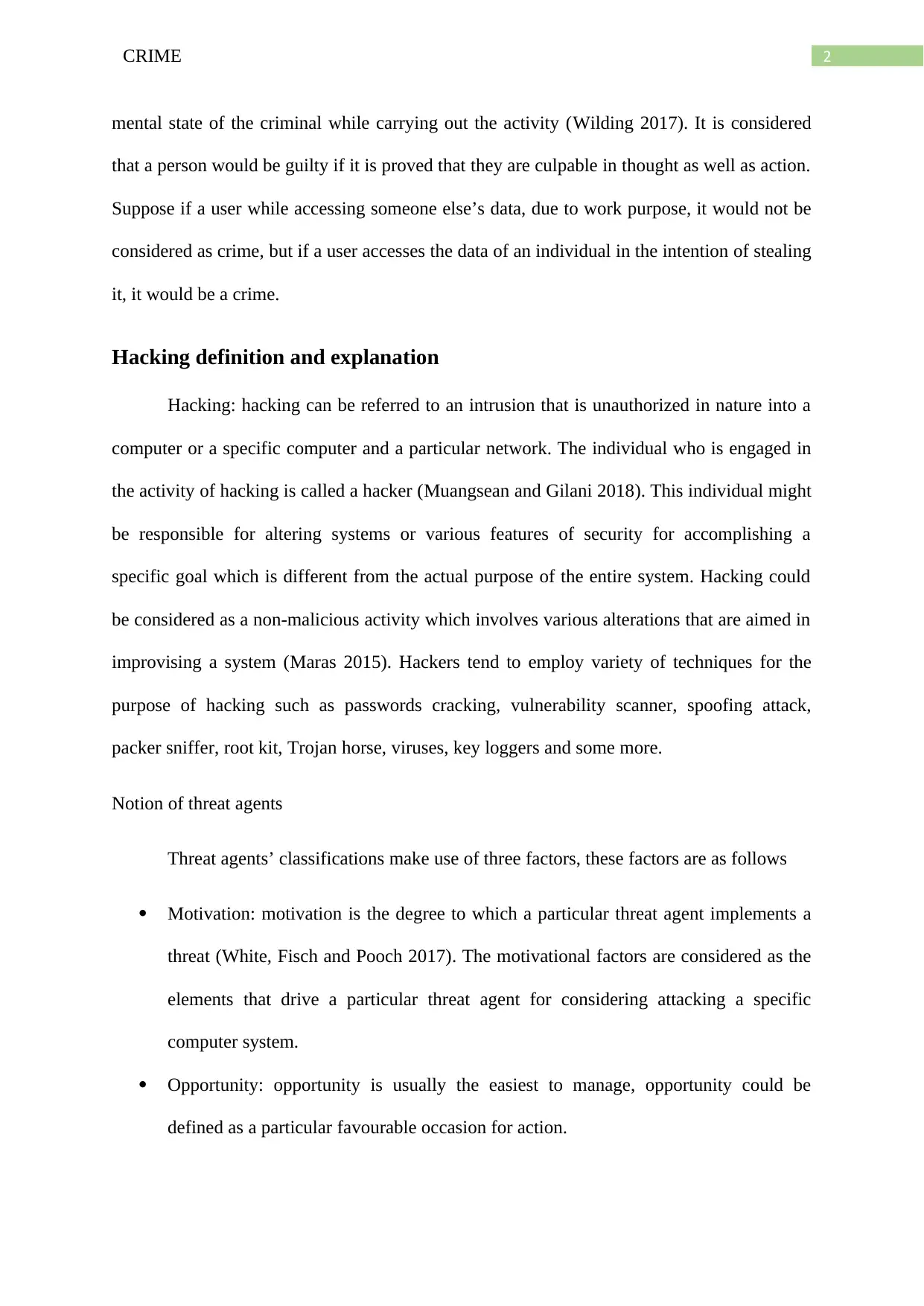
2CRIME
mental state of the criminal while carrying out the activity (Wilding 2017). It is considered
that a person would be guilty if it is proved that they are culpable in thought as well as action.
Suppose if a user while accessing someone else’s data, due to work purpose, it would not be
considered as crime, but if a user accesses the data of an individual in the intention of stealing
it, it would be a crime.
Hacking definition and explanation
Hacking: hacking can be referred to an intrusion that is unauthorized in nature into a
computer or a specific computer and a particular network. The individual who is engaged in
the activity of hacking is called a hacker (Muangsean and Gilani 2018). This individual might
be responsible for altering systems or various features of security for accomplishing a
specific goal which is different from the actual purpose of the entire system. Hacking could
be considered as a non-malicious activity which involves various alterations that are aimed in
improvising a system (Maras 2015). Hackers tend to employ variety of techniques for the
purpose of hacking such as passwords cracking, vulnerability scanner, spoofing attack,
packer sniffer, root kit, Trojan horse, viruses, key loggers and some more.
Notion of threat agents
Threat agents’ classifications make use of three factors, these factors are as follows
Motivation: motivation is the degree to which a particular threat agent implements a
threat (White, Fisch and Pooch 2017). The motivational factors are considered as the
elements that drive a particular threat agent for considering attacking a specific
computer system.
Opportunity: opportunity is usually the easiest to manage, opportunity could be
defined as a particular favourable occasion for action.
mental state of the criminal while carrying out the activity (Wilding 2017). It is considered
that a person would be guilty if it is proved that they are culpable in thought as well as action.
Suppose if a user while accessing someone else’s data, due to work purpose, it would not be
considered as crime, but if a user accesses the data of an individual in the intention of stealing
it, it would be a crime.
Hacking definition and explanation
Hacking: hacking can be referred to an intrusion that is unauthorized in nature into a
computer or a specific computer and a particular network. The individual who is engaged in
the activity of hacking is called a hacker (Muangsean and Gilani 2018). This individual might
be responsible for altering systems or various features of security for accomplishing a
specific goal which is different from the actual purpose of the entire system. Hacking could
be considered as a non-malicious activity which involves various alterations that are aimed in
improvising a system (Maras 2015). Hackers tend to employ variety of techniques for the
purpose of hacking such as passwords cracking, vulnerability scanner, spoofing attack,
packer sniffer, root kit, Trojan horse, viruses, key loggers and some more.
Notion of threat agents
Threat agents’ classifications make use of three factors, these factors are as follows
Motivation: motivation is the degree to which a particular threat agent implements a
threat (White, Fisch and Pooch 2017). The motivational factors are considered as the
elements that drive a particular threat agent for considering attacking a specific
computer system.
Opportunity: opportunity is usually the easiest to manage, opportunity could be
defined as a particular favourable occasion for action.
⊘ This is a preview!⊘
Do you want full access?
Subscribe today to unlock all pages.

Trusted by 1+ million students worldwide
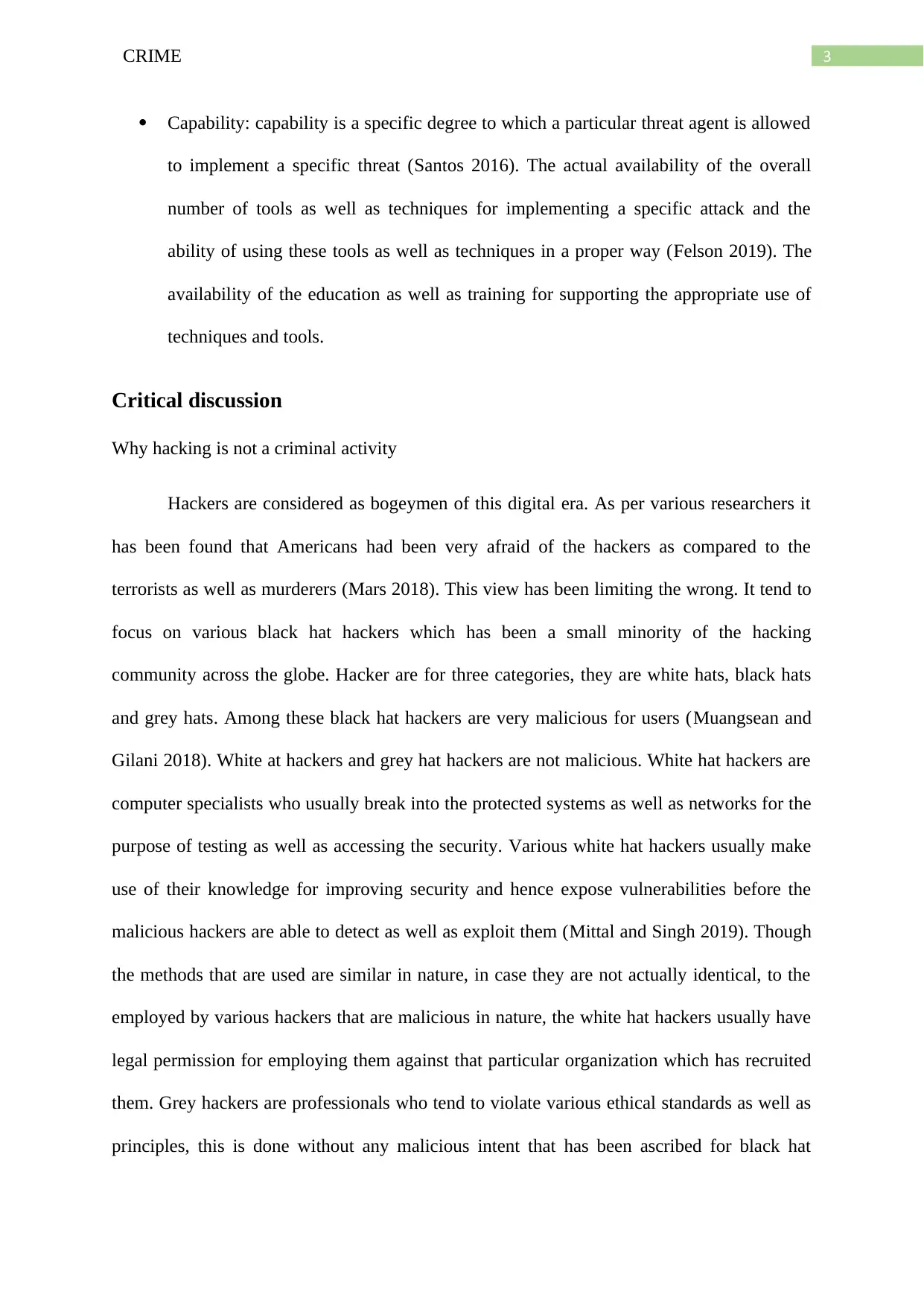
3CRIME
Capability: capability is a specific degree to which a particular threat agent is allowed
to implement a specific threat (Santos 2016). The actual availability of the overall
number of tools as well as techniques for implementing a specific attack and the
ability of using these tools as well as techniques in a proper way (Felson 2019). The
availability of the education as well as training for supporting the appropriate use of
techniques and tools.
Critical discussion
Why hacking is not a criminal activity
Hackers are considered as bogeymen of this digital era. As per various researchers it
has been found that Americans had been very afraid of the hackers as compared to the
terrorists as well as murderers (Mars 2018). This view has been limiting the wrong. It tend to
focus on various black hat hackers which has been a small minority of the hacking
community across the globe. Hacker are for three categories, they are white hats, black hats
and grey hats. Among these black hat hackers are very malicious for users (Muangsean and
Gilani 2018). White at hackers and grey hat hackers are not malicious. White hat hackers are
computer specialists who usually break into the protected systems as well as networks for the
purpose of testing as well as accessing the security. Various white hat hackers usually make
use of their knowledge for improving security and hence expose vulnerabilities before the
malicious hackers are able to detect as well as exploit them (Mittal and Singh 2019). Though
the methods that are used are similar in nature, in case they are not actually identical, to the
employed by various hackers that are malicious in nature, the white hat hackers usually have
legal permission for employing them against that particular organization which has recruited
them. Grey hackers are professionals who tend to violate various ethical standards as well as
principles, this is done without any malicious intent that has been ascribed for black hat
Capability: capability is a specific degree to which a particular threat agent is allowed
to implement a specific threat (Santos 2016). The actual availability of the overall
number of tools as well as techniques for implementing a specific attack and the
ability of using these tools as well as techniques in a proper way (Felson 2019). The
availability of the education as well as training for supporting the appropriate use of
techniques and tools.
Critical discussion
Why hacking is not a criminal activity
Hackers are considered as bogeymen of this digital era. As per various researchers it
has been found that Americans had been very afraid of the hackers as compared to the
terrorists as well as murderers (Mars 2018). This view has been limiting the wrong. It tend to
focus on various black hat hackers which has been a small minority of the hacking
community across the globe. Hacker are for three categories, they are white hats, black hats
and grey hats. Among these black hat hackers are very malicious for users (Muangsean and
Gilani 2018). White at hackers and grey hat hackers are not malicious. White hat hackers are
computer specialists who usually break into the protected systems as well as networks for the
purpose of testing as well as accessing the security. Various white hat hackers usually make
use of their knowledge for improving security and hence expose vulnerabilities before the
malicious hackers are able to detect as well as exploit them (Mittal and Singh 2019). Though
the methods that are used are similar in nature, in case they are not actually identical, to the
employed by various hackers that are malicious in nature, the white hat hackers usually have
legal permission for employing them against that particular organization which has recruited
them. Grey hackers are professionals who tend to violate various ethical standards as well as
principles, this is done without any malicious intent that has been ascribed for black hat
Paraphrase This Document
Need a fresh take? Get an instant paraphrase of this document with our AI Paraphraser
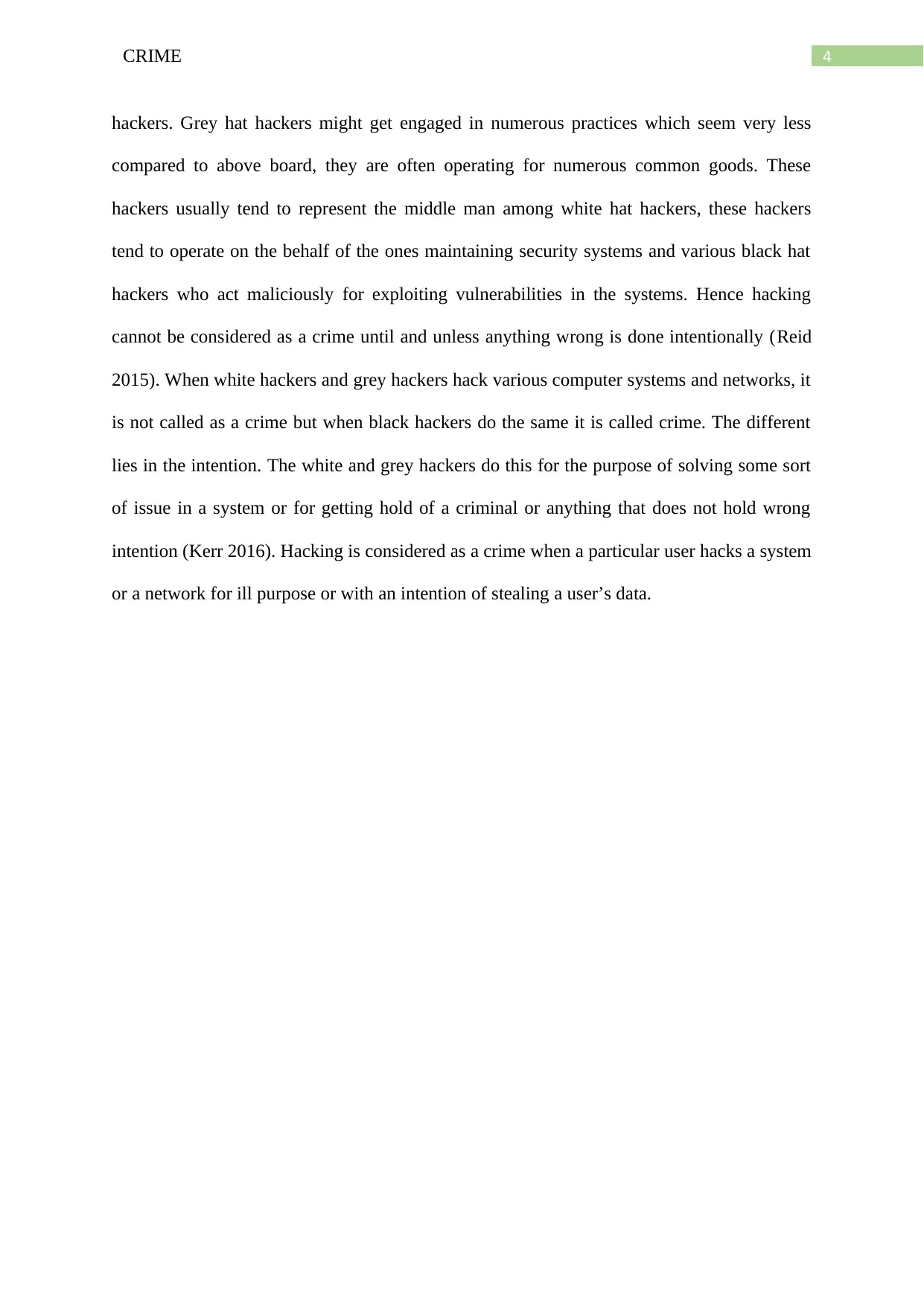
4CRIME
hackers. Grey hat hackers might get engaged in numerous practices which seem very less
compared to above board, they are often operating for numerous common goods. These
hackers usually tend to represent the middle man among white hat hackers, these hackers
tend to operate on the behalf of the ones maintaining security systems and various black hat
hackers who act maliciously for exploiting vulnerabilities in the systems. Hence hacking
cannot be considered as a crime until and unless anything wrong is done intentionally (Reid
2015). When white hackers and grey hackers hack various computer systems and networks, it
is not called as a crime but when black hackers do the same it is called crime. The different
lies in the intention. The white and grey hackers do this for the purpose of solving some sort
of issue in a system or for getting hold of a criminal or anything that does not hold wrong
intention (Kerr 2016). Hacking is considered as a crime when a particular user hacks a system
or a network for ill purpose or with an intention of stealing a user’s data.
hackers. Grey hat hackers might get engaged in numerous practices which seem very less
compared to above board, they are often operating for numerous common goods. These
hackers usually tend to represent the middle man among white hat hackers, these hackers
tend to operate on the behalf of the ones maintaining security systems and various black hat
hackers who act maliciously for exploiting vulnerabilities in the systems. Hence hacking
cannot be considered as a crime until and unless anything wrong is done intentionally (Reid
2015). When white hackers and grey hackers hack various computer systems and networks, it
is not called as a crime but when black hackers do the same it is called crime. The different
lies in the intention. The white and grey hackers do this for the purpose of solving some sort
of issue in a system or for getting hold of a criminal or anything that does not hold wrong
intention (Kerr 2016). Hacking is considered as a crime when a particular user hacks a system
or a network for ill purpose or with an intention of stealing a user’s data.
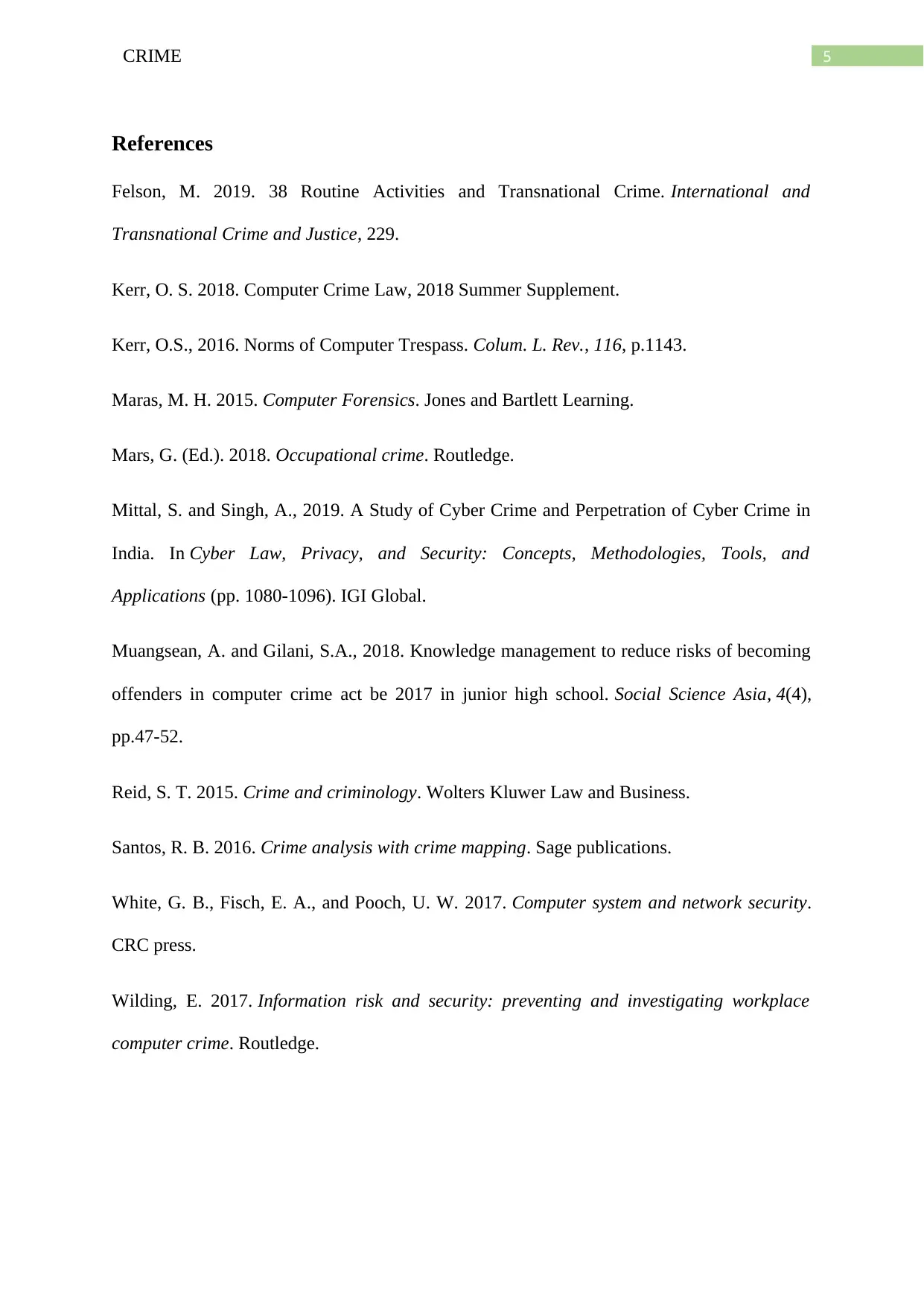
5CRIME
References
Felson, M. 2019. 38 Routine Activities and Transnational Crime. International and
Transnational Crime and Justice, 229.
Kerr, O. S. 2018. Computer Crime Law, 2018 Summer Supplement.
Kerr, O.S., 2016. Norms of Computer Trespass. Colum. L. Rev., 116, p.1143.
Maras, M. H. 2015. Computer Forensics. Jones and Bartlett Learning.
Mars, G. (Ed.). 2018. Occupational crime. Routledge.
Mittal, S. and Singh, A., 2019. A Study of Cyber Crime and Perpetration of Cyber Crime in
India. In Cyber Law, Privacy, and Security: Concepts, Methodologies, Tools, and
Applications (pp. 1080-1096). IGI Global.
Muangsean, A. and Gilani, S.A., 2018. Knowledge management to reduce risks of becoming
offenders in computer crime act be 2017 in junior high school. Social Science Asia, 4(4),
pp.47-52.
Reid, S. T. 2015. Crime and criminology. Wolters Kluwer Law and Business.
Santos, R. B. 2016. Crime analysis with crime mapping. Sage publications.
White, G. B., Fisch, E. A., and Pooch, U. W. 2017. Computer system and network security.
CRC press.
Wilding, E. 2017. Information risk and security: preventing and investigating workplace
computer crime. Routledge.
References
Felson, M. 2019. 38 Routine Activities and Transnational Crime. International and
Transnational Crime and Justice, 229.
Kerr, O. S. 2018. Computer Crime Law, 2018 Summer Supplement.
Kerr, O.S., 2016. Norms of Computer Trespass. Colum. L. Rev., 116, p.1143.
Maras, M. H. 2015. Computer Forensics. Jones and Bartlett Learning.
Mars, G. (Ed.). 2018. Occupational crime. Routledge.
Mittal, S. and Singh, A., 2019. A Study of Cyber Crime and Perpetration of Cyber Crime in
India. In Cyber Law, Privacy, and Security: Concepts, Methodologies, Tools, and
Applications (pp. 1080-1096). IGI Global.
Muangsean, A. and Gilani, S.A., 2018. Knowledge management to reduce risks of becoming
offenders in computer crime act be 2017 in junior high school. Social Science Asia, 4(4),
pp.47-52.
Reid, S. T. 2015. Crime and criminology. Wolters Kluwer Law and Business.
Santos, R. B. 2016. Crime analysis with crime mapping. Sage publications.
White, G. B., Fisch, E. A., and Pooch, U. W. 2017. Computer system and network security.
CRC press.
Wilding, E. 2017. Information risk and security: preventing and investigating workplace
computer crime. Routledge.
⊘ This is a preview!⊘
Do you want full access?
Subscribe today to unlock all pages.

Trusted by 1+ million students worldwide
1 out of 6
Related Documents
Your All-in-One AI-Powered Toolkit for Academic Success.
+13062052269
info@desklib.com
Available 24*7 on WhatsApp / Email
![[object Object]](/_next/static/media/star-bottom.7253800d.svg)
Unlock your academic potential
Copyright © 2020–2026 A2Z Services. All Rights Reserved. Developed and managed by ZUCOL.





